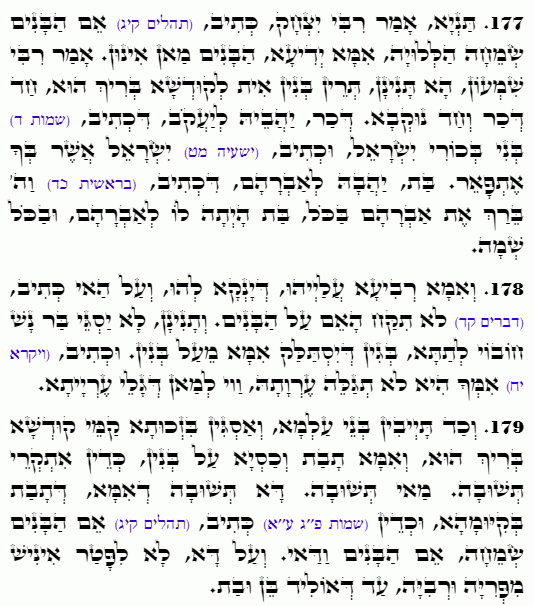Daily Zohar # 4751 – Vayechi – You shall not take the mother with the young
Daily Zohar 4751

Hebrew translation:
178. וְהָאֵם רוֹבֶצֶת עֲלֵיהֶם, שֶׁמֵּינִיקָה אוֹתָם, וְעַל זֶה כָּתוּב לֹא תִקַּח הָאֵם עַל הַבָּנִים. וְשָׁנִינוּ, אַל יַרְבֶּה הָאָדָם חֲטָאָיו לְמַטָּה, כְּדֵי שֶׁתִּסְתַּלֵּק הָאֵם מֵעַל הַבָּנִים, וְכָתוּב (ויקרא יח) אִמְּךָ הִוא לֹא תְגַלֶּה עֶרְוָתָהּ. אוֹי לְמִי שֶׁמְּגַלֶּה עֶרְוָתָהּ.
179. וּכְשֶׁשָּׁבִים בְּנֵי הָעוֹלָם וּמַרְבִּים בִּזְכֻיּוֹת לִפְנֵי הַקָּדוֹשׁ בָּרוּךְ הוּא, וְהָאֵם שָׁבָה וּמְכַסָּה עַל הַבָּנִים, אָז זֶה נִקְרָא תְשׁוּבָה. מַה זֶּה תְּשׁוּבָה? זוֹ תְשׁוּבָה שֶׁל הָאֵם שֶׁשָּׁבָה בְּקִיּוּמָהּ, וְאָז כָּתוּב אֵם הַבָּנִים שְׂמֵחָה. אֵם הַבָּנִים וַדַּאי. וְלָכֵן לֹא יִפָּטֵר הָאָדָם מִפְּרִיָּה וּרְבִיָּה עַד שֶׁמּוֹלִיד בֵּן וּבַת.
.
Zohar Vayechi
Continued from previous DZ
#177
Rabbi Yitzchak said: It is written, “אִם הַבָּנִים שְׂמֵחָה הַלְלוּיָה”—”The joyful mother of children, Hallelujah” (Psalms 113:9). “אִם” (“mother”)—it is known who she is, for she is Binah. But who are the “children”? Rabbi Shimon said: “We have learned that the Holy One, Blessed be He, (from the aspect of Binah, Mother) has two children: one male and one female. The male was given to Jacob, as it is written, ‘בְּנִי בְּכוֹרִי יִשְׂרָאֵל’—”Israel is My firstborn son” (Exodus 4:22), and it is also written, ‘יִשְׂרָאֵל אֲשֶׁר בְּךָ אֶתְפָּאֵר’—”Israel, in whom I glory” (Isaiah 49:3).
The daughter was given to Abraham, as it is written, “וַה’ בֵּרַךְ אֶת אַבְרָהָם בַּכֹּל”—”And Hashem blessed Abraham with everything” (Genesis 24:1). The word “everything” (בַּכֹּל) refers to a daughter named בַּכֹּל (“Bakol”).”
Binah, the supernal Mother in the Sefirot, has two children: Tiferet (the son) and Malchut (the daughter).
Tiferet (the son): Given to Jacob, as Jacob serves as the spiritual chariot (Merkava) for Tiferet.
Malchut (the daughter): Given to Abraham, as Abraham is the chariot for Chessed within Zeir Anpin. Malchut, or the Nukva, becomes complete and rectified only through Chessed, thus connecting it to Abraham.
#178
And the Mother, who is Binah, hovers over them “הָאֵם רוֹבֶצֶת עֲלֵיהֶם,” over Zeir Anpin and Nukva, to nourish them. And about this, it is written: “לֹא תִקַּח הָאֵם עַל הַבָּנִים” “You shall not take the mother with the young” (Deuteronomy 22:6). And we have learned that this means a person should not increase sins below, in this world, because by doing so, the Mother, who is Binah, will be removed from the children, who are Zeir Anpin and Nukva. And it is written: “אִמְּךָ הִוא לֹא תְגַלֶּה עֶרְוָתָהּ” “It is your mother’s nakedness; you shall not uncover her nakedness” (Leviticus 18:7), meaning one should not cause her to be removed from the children. Woe to the one who reveals nakedness, meaning the one who causes the Mother to be removed from the children.
#179
When the people of the world repent and increase their good deeds before the Holy One, Blessed be He, then the Mother, Binah, returns to cover the children, Zeir Anpin and Nukva. At that time, Binah is called “Teshuvah.”
He asks: Why is she called “Teshuvah”? and answer: This is “Teshuvah” because she returns (שָּׁבָה) to her position, meaning that Binah returns to cover the children, which are Zeir Anpin and Nukva, nourishing them as before. Then it is written:
“אִם הַבָּנִים שְׂמֵחָה” “The mother of the children is joyful” (Psalms 113:9). Indeed, “the mother of the children” refers to Binah.
Therefore, a person does not fulfill the mitzvah of being fruitful and multiplying until he begets a son and a daughter, corresponding to Zeir Anpin and Nukva, the children of Binah.
Notes:
The name “Teshuvah” for Binah reflects its function of returning to its proper role as the nurturer of Zeir Anpin and Nukva when people repent and do good deeds. This dynamic is spiritually mirrored in the mitzvah of bearing children, representing the completion of unity.
{||}

 Previous: Vayechi
Previous: Vayechi

